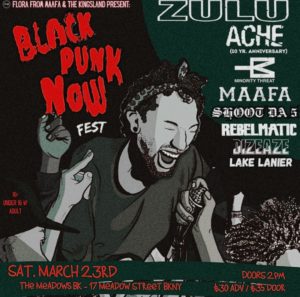When most people think of Punk, there’s a few standard images that immediately come to mind. Large spiky and colorful mohawks and outfits with embellishments ranging from patches, safety pins, rips, and studs. People wearing giant combat boots (specifically Doc Martens) who are loud, rambunctious, and clearly Anti-everything. T-shirts and posters with bands like The Ramones or The Sex Pistols plastered on them. This is some of the most common imagery of the punk subculture. But one myth about these details is that everything punk is and represents is supposed to be–white.
Black people have been makers and innovators in each and every subject including (you guessed it) punk rock. And while many punk fans would attribute the earliest punk bands to only white artists, we cannot forget the Black trailblazers who pioneered the sound and vitality in the genre we love today. Bands like Pure Hell, Bad Brains, and X-Ray Spex and many more have created the roots of punk music. Punk was said to have arrived around the late 60’s, and we can conclude that punk wouldn’t be what it is today without it having pulled elements by Black people and culture. Whether it’s musicians like Chuck Berry or Sister Rosetta Thorpe with their compelling vocals and guitar, African and Indigenous beats, or energetic styles from Ska and Reggae–punk would not have the soul or the substance without its’ architects.
While the Black experience is not monolithic and is one that differs from person to person, one commonality is that the stories through each generation have been that of resilience and resistance. Many Black people can say that their existence feels synonymous with what the Punk subculture represents. From the fight against oppressive systems and the establishment, to existing as one’s authentic self even when treated like an outcast in society. From our growing artistry in each and every subject, to us finding new ways to cultivate our passions through our resources. And ultimately, the community we build through advocacy and spreading critical information. While some may say Blackness does not necessarily equate punkness, it’s true to say in the least that by our livelihood, we are the essence of what the punk ideology represents. Not the refusal of just anything and everything for the sake of an aesthetic or label. We live it.
Decades in the Making
Many people may be surprised to learn that there has always been a Black punk community. While it is definitely not plastered in the modern mainstream, this community has long existed since the origins of punk. But despite its presence, being Black and punk can be a lonely and often alienating experience. Especially for those growing up in small towns with predominantly white people–which meant that the scarce venues that did feature punk and alternative bands would have even less marginalized people in the audience. This also further pushed the narrative that Black people aren’t interested or shouldn’t be in the punk scene at all.
These are topics uncovered by James Spooner, the award winning graphic novelist and director of the 2003 Afro-Punk documentary. This hour long film focuses on the lives of Black people in the punk rock scene, and features interviews of over 80 Black punks all across the United States. The documentary led him to co-found the AfroPunk festival, which I discuss in an earlier post. Both the film and festival have carried a dialogue about Black punk fans, their world, and their contributions.
But now, 20 years later, some important questions arise today in our modern world. With the ever-changing culture of how we consume music and information, is Black punk still alive and able to sustain its roots and foundational integrity? Black Punk Now, an anthology by James Spooner & Chris L. Terry, delves into this observation. By showcasing the styles and identities of the Black punk world throughout generations with illustrations, comics, contemporary non-fiction, and fiction–we get to take a look into the past and present artists in Black Punk, as well as a look into its possible future.
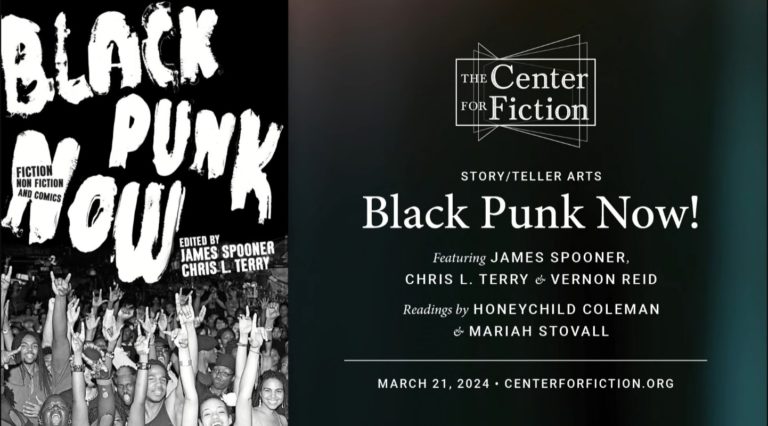
Book Release Party in Brooklyn
On March 21st, the Center for Fiction in Brooklyn hosted an event for the release of Black Punk Now. Editors James Spooner & Chris L. Terry were joined by Living Colour’s legendary Vernon Reid, as well as contributors from the book – Honeychild Coleman of The 1865 and Sista Grrrl, and novelist Mariah Stovall. Tickets were only under $10 to attend and there was an option of live streaming the event which I always appreciate. Everyone read their own selected passages from the book and each spoke about their influence not only in the collection, but in the Black punk community throughout their lives.
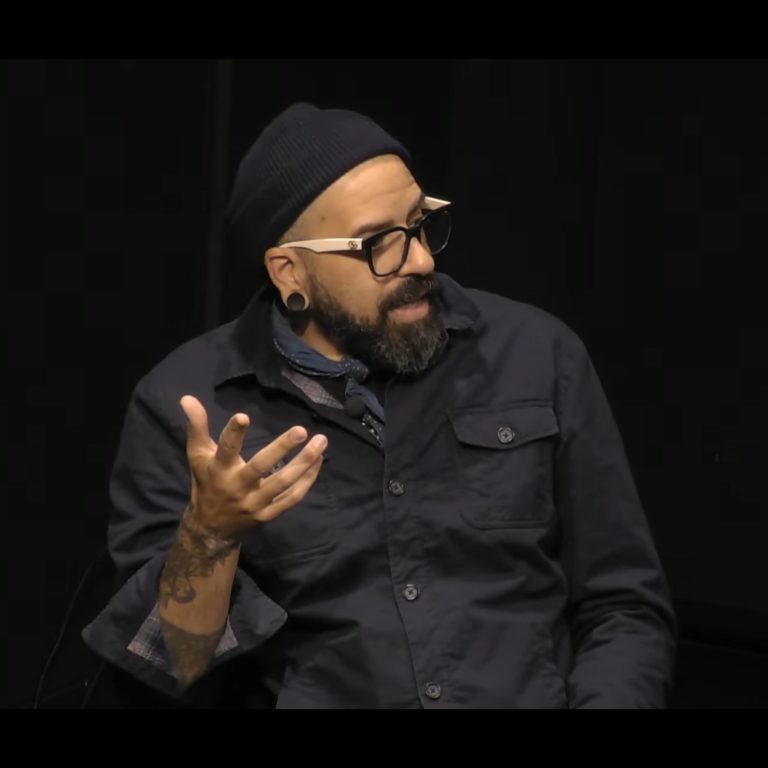
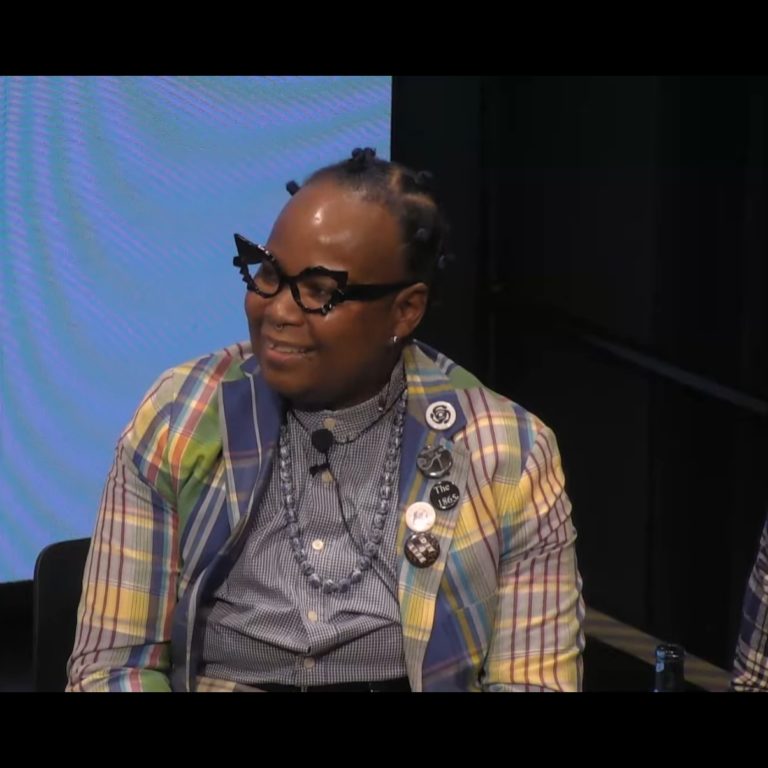
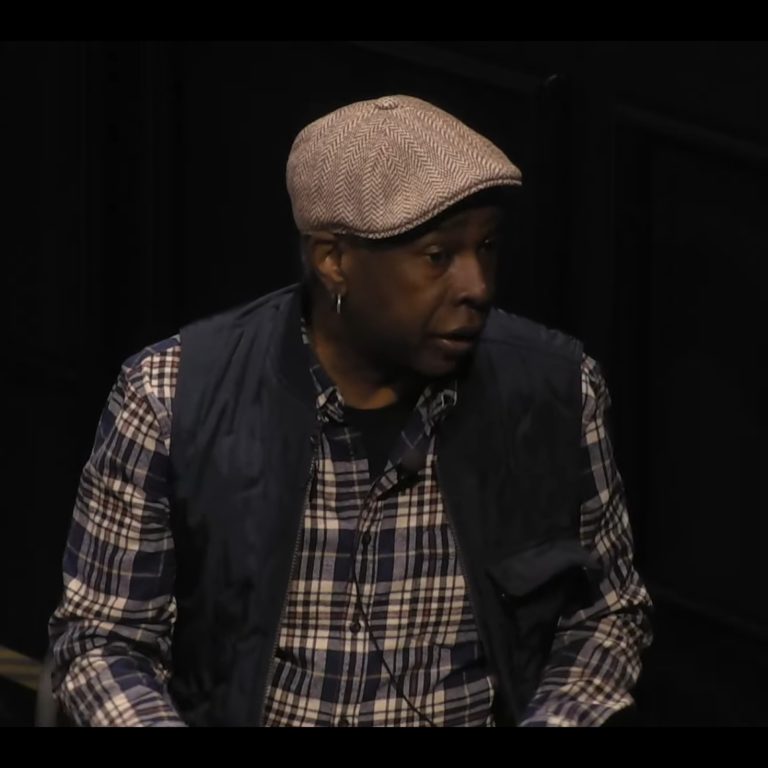
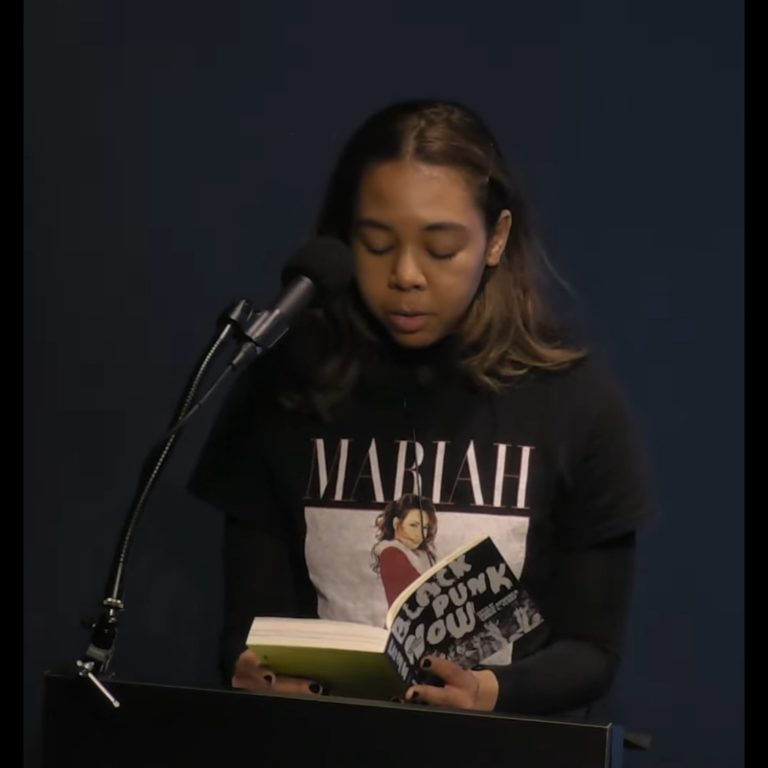
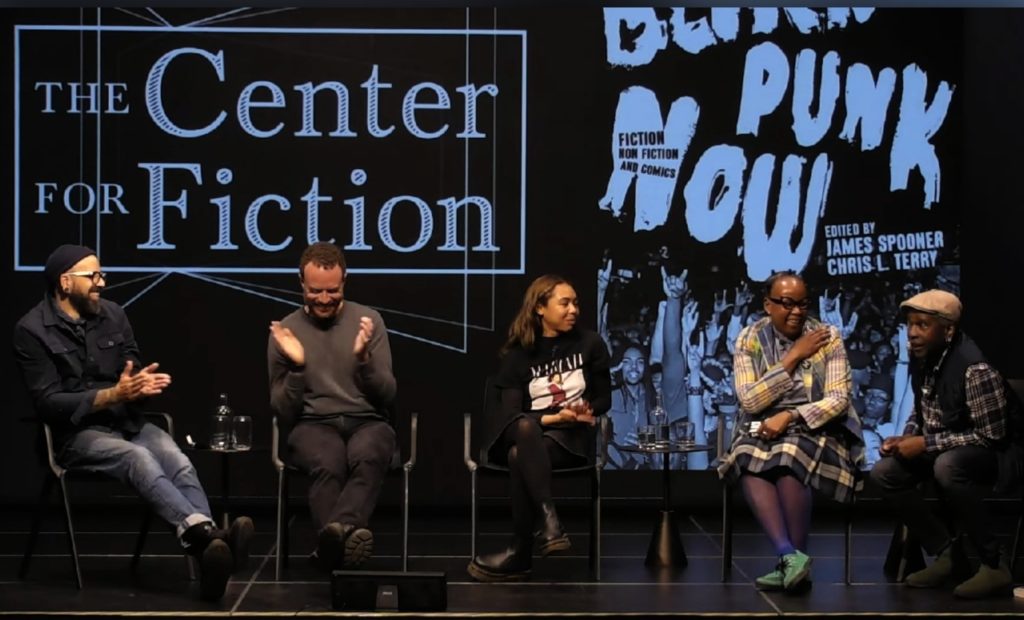
Each collaborator had their own perspective on what Black punk means to them, and how they define punk. It was really thought provoking to see how the speakers, while all with different backstories, agreed on some similarities of the punk ideology. While some said it was reactionary, especially in the political sense, others also agreed that the movement is in a continuum- that it’s not just the musical style but the energy and sense of community with other Black and marginalized punks. James Spooner spoke about his experience of having to walk away from AfroPunk – and how difficult a decision it was to make, seeing what started as an authentic Black punk movement turn into an easily commodified event. A question that was brought up by the audience was, is Blackness automatically punk? Vernon mentioned that while some artists like Jimi Hendrix may not have been categorized as punk, they definitely have the essence of what it represents. James then spoke about that sometimes automatically casting Black people as punk does risk the possibility of the community being even more dissolved and unseen by the mainstream.
Black Hardcore Festival
The Black Punk party continued in Brooklyn for an all day concert on March 23rd. This event celebrated Black Punk musicians in the scene like Zulu, Rebelmatic, Maafa, and Ache (which was celebrating their 10 year anniversary). Black alternative and hardcore artists don’t get enough recognition for their artistry, and this was an event to really appreciate them. The tickets were about $30, and featured James & Chris, and other contributors selling books and merchandise.
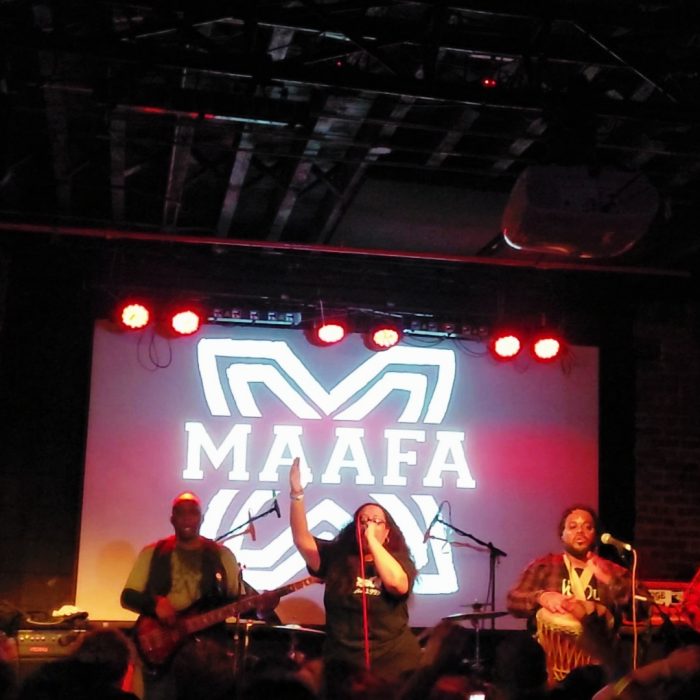
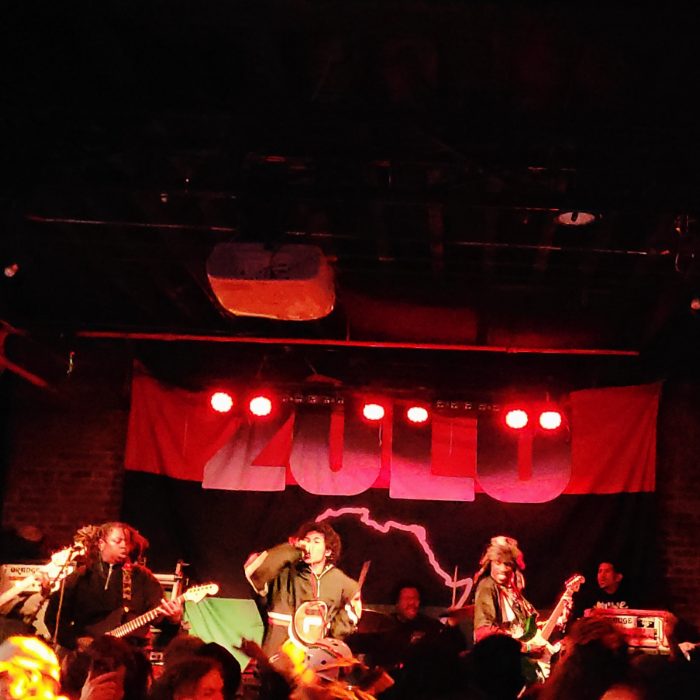
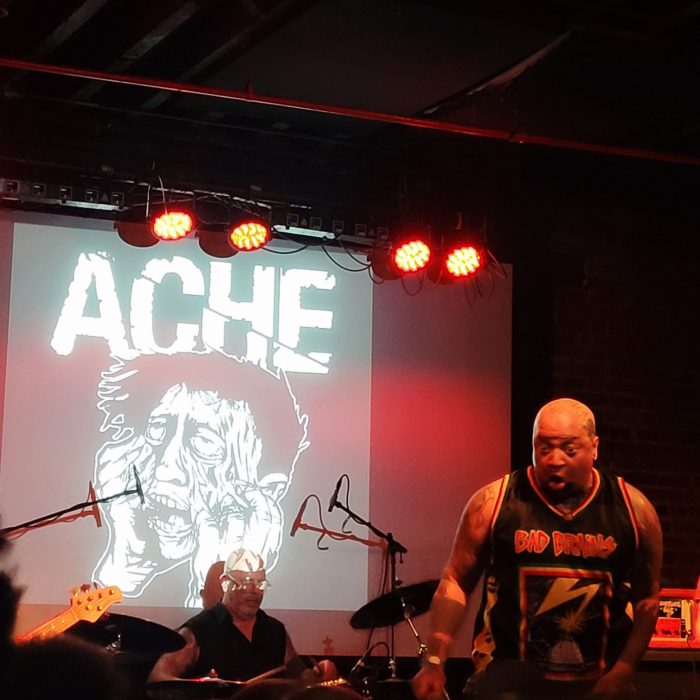

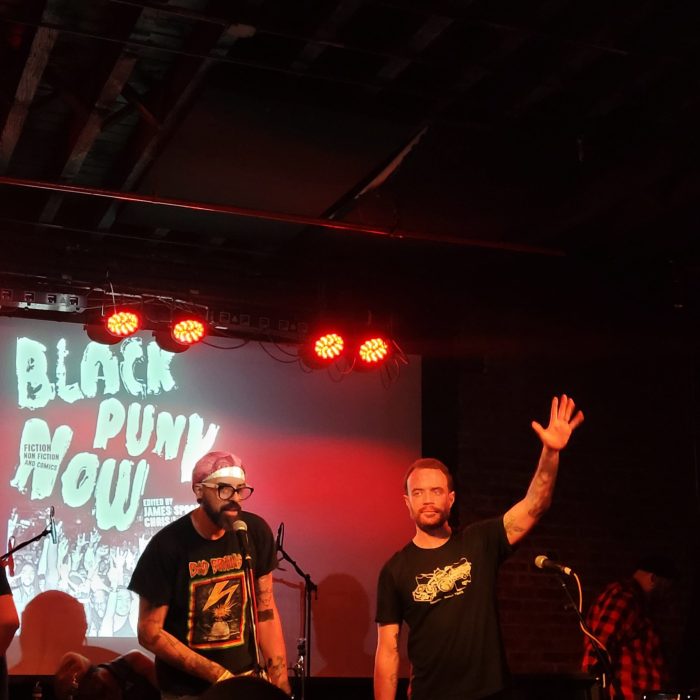
This was such a cool event to attend. The turnout was incredible, and seeing so many young and older Black punks celebrating, moshing, screaming, and dancing was pure joy. The bands all did remarkably, and people as always were looking out for others in the pit. It was cool to see parents bring their teens to start the next generation of Black punk adults.
The Future of punk is Black
As I’ve mentioned in previous posts before, reconnecting with the alternative scene–specifically Black and POC communities, has had a great impact on my life. Growing up I always felt off-beat, like there was something wrong with me, or at least the way people perceived me. Black and marginalized groups have always had to maneuver the existence of ourselves in a racist and phobic world, while simultaneously battling the growing pains of life. We’re told we are supposed to fit inside the confines of a stereotypical box, and that some passions and interests don’t belong to us, despite the evidence disproving so. There’s something truly unique about finding a place where you fit in, despite that inner monologue saying you’re not good enough or taking up too much space. I think Black Punk Now proves that speaking about these experiences especially in this medium is a lot more valuable than we think. It shines light on the fact that we are not alone, and that we are able to take up space despite what the mainstream may tell us. Punk is for everyone, but more specifically, punk is ours.
For the Black and Brown kids that have ever felt unseen or unheard, you belong here. YOU belong in punk. We’re still here.
“Black punk, at its best, offers us the rare opportunity to nakedly pursue freedom. Black punk means creativity, resilience, an actively intersectional political awareness and engagement (or willingness to put in the work and learn), and a fundamental drive to interrogate the hegemony of dominant cultural norms, in the world and within, on every level through exploration and radical self-honesty.”
--Golden Sunrise Collier
As always, thank you for reading! Here are some more suggested readings on the Black Punk community, as well as links to the creators and artists in this article.
Authors & Artists Featured in Event
Bands Featured
Suggested Readings:

